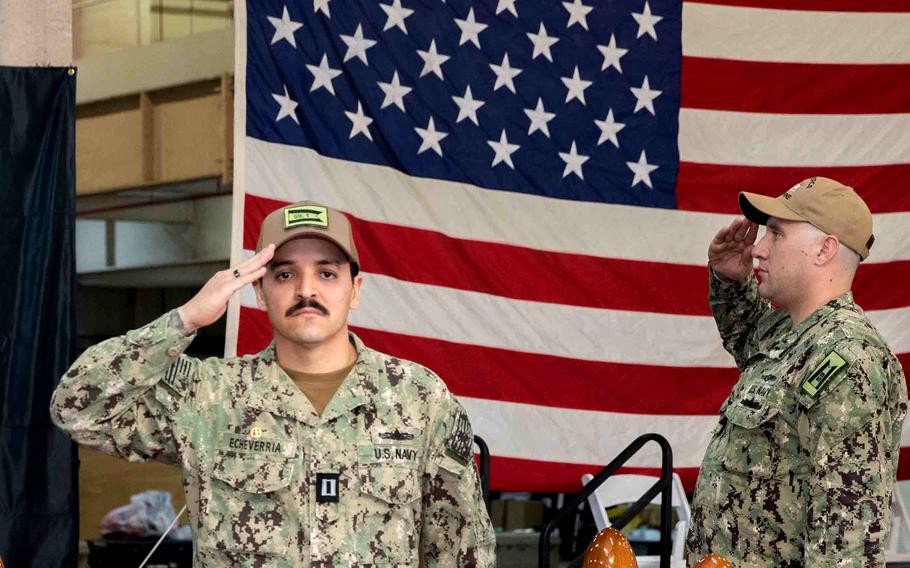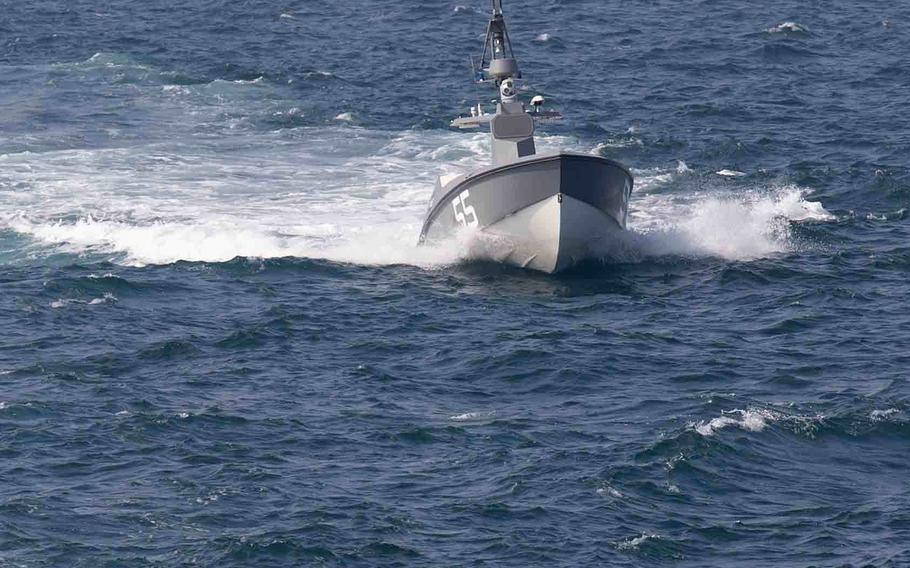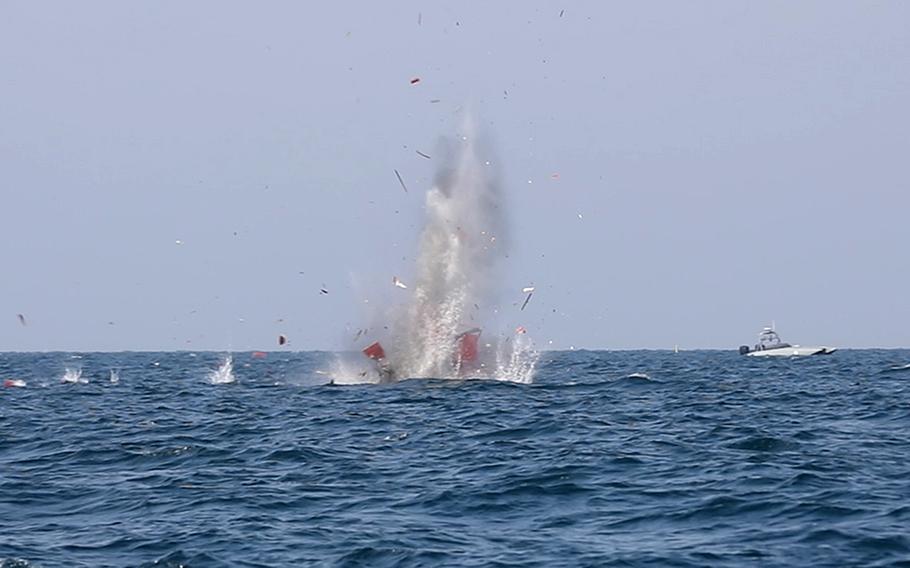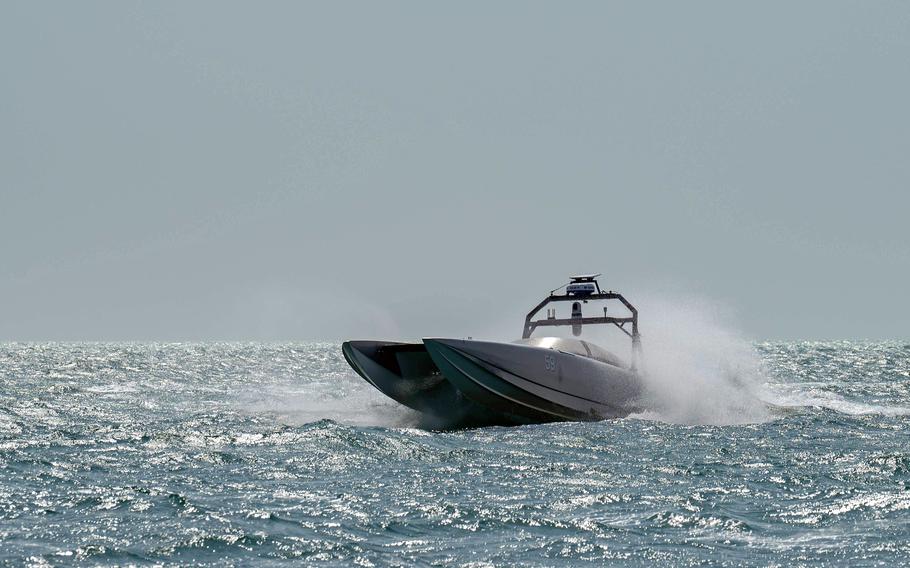
Lt. Luis Echeverria, commander of Task Group 59.1, takes the reins during a commissioning ceremony for the unit in Manama, Bahrain, on Jan. 3, 2024. (Marita Schwab/U.S. Army)
The U.S. Navy’s drone boats in the Middle East are moving out of testing and into combat-ready roles under a new unit based in Bahrain.
Experimental unmanned surface vessels operated by the service’s Task Group 59.1 could be used to launch missiles at enemy targets and to guide special operations teams, among other operations, said Navy Lt. Luis Echeverria, the unit commander.
Echeverria took charge of the unit, which includes civilian contractors and seven sailors, on Jan. 3 at Naval Support Activity Bahrain, the headquarters of the 5th Fleet.
Middle Eastern waters have become battlegrounds in recent months as Houthi militants in Yemen have fired missiles at commercial shipping. In response, the Navy has shot down drone swarms and launched strikes to take out Houthi weapons stocks.

An Arabian Fox MAST-13 unmanned surface vessel attached to U.S. Central Command’s Task Force 59 conducts surveillance in the Persian Gulf on Nov. 21, 2023. (Tyrin Saunders/U.S. Army)
The unit’s formation was in the works long before recent tensions in the Middle East, Echeverria said, adding that it assisted a counter-mine task force during its first exercise.
The October exercise Digital Talon 2 offered another example of the type of work that the unit will undertake, Echeverria said.
In that exercise, an unmanned speedboat launched Switchblade missiles with the help of other naval drones to destroy a target boat off the Arabian Peninsula. A sailor at an operations center in Bahrain fired the missiles, and Special Operations Command Central also took part, a Navy statement said.
Interdictions in which unmanned drones guide Navy SEALs to drug and weapons smugglers also will be part of the duties, Echeverria said. Such missions are among the most dangerous on the high seas.
Two Navy SEALs who fell into the Arabian Sea during an interdiction mission Jan. 11 were declared dead Monday. The interdiction seized missile parts that the U.S. Navy says were made in Iran for use by Houthi militants.

Munitions launched from a missile system aboard a T-38 Devil Ray drone boat destroy a target during exercise Digital Talon 2 in the Persian Gulf on Nov. 27, 2023. (Marita Schwab/U.S. Army)
Vice Adm. Brad Cooper, 5th fleet commander, didn’t directly say the fleet’s drones participated in that interdiction but didn’t rule it out during an Associated Press interview Monday.
“They are specifically designed to conduct interdiction operations,” he said. Cooper added: “There’s no squeaking anything by it.”
A statement Tuesday from 5th Fleet declined to comment on Task Group 59.1’s involvement in specific operations.
Task Force 59, the Navy unit that has tested commercial drones in exercises, isn’t involved in operations defending ships in the Red Sea or against Houthi positions in Yemen, U.S. 5th Fleet spokesman Cmdr. Rick Chernitzer said Tuesday.
Using naval drones in missions is the logical next step for the Navy, said P.W. Singer, a political scientist whose works on drone warfare have been cited extensively by military officials.
“The earlier exercises were originally meant as learning experiments, which are incredibly valuable,” Singer said. “Now, the fleet can start to apply those lessons, and, in turn, learn even more by doing even more.”

A MARTAC T-38 Devil Ray drone boat attached to U.S. 5th Fleet’s Task Force 59 sails in the Persian Gulf in October 2023. Task Group 59.1 has been stood up in Bahrain to focus on deploying the boats in missions in the Middle East. (Jacob Vernier/U.S. Navy)